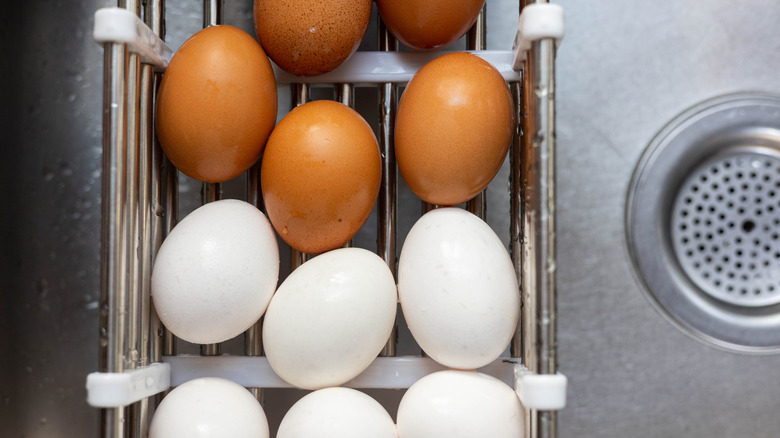Do You Need To Wash Farmers Market Eggs?
Don't make the mistake of buying only produce at your local farmers market — there are typically vendors with other fantastic items like cheese, honey, and of course, farm-fresh eggs. However, those who are purchasing eggs at the farmers market for the first time may wonder if they need to be handled any differently than grocery store eggs. Store-bought eggs made our list of foods you shouldn't be washing, as they're always washed prior to being sold, and additional washing could cause issues because of how porous egg shells are. Farm-fresh eggs are a little different in terms of if and how they should be washed.
Always start by evaluating your eggs and checking for any kind of visible debris on the shell, such as straw or manure. If you find any, you'll want to clean them prior to cooking to help reduce your risk of exposure to salmonella. Eggs that come straight from the farm typically have a natural coating called a "bloom," which you won't find on washed, store-bought eggs. This coating prevents bacteria from penetrating the shell and is why farm-fresh eggs can be stored at room temperature while store-bought eggs need to be refrigerated. You can make your eggs last longer by not washing them, but for farm-fresh eggs, you can (and should) try the dry-washing method, in which you use something like a brush, cloth, or even fine sandpaper to remove any debris without destroying the eggs' protective bloom.
Washing your eggs more thoroughly
In situations where your eggs appear particularly dirty, or if you're not familiar with the farm where they originated and are a bit worried about their cleanliness, you might want to opt for the wet-washing method. This, as you may have guessed, involves using water to clean your eggs; however, there are a few best practices to keep in mind with this approach.
In terms of water temperature, avoid cold water and use warm to hot water instead. Cold water will cause the eggs' contents to contract while warmer water makes them expand, and this impacts how effectively bacteria can (or can't) penetrate the eggs' surface. Simply upping the temperature of your water decreases the amount of bacteria that can potentially reach the eggs' interior. A rule of thumb is that the water used to wash your eggs should be about 20 degrees Fahrenheit warmer than the egg itself, so the fresher the egg, the hotter the water needs to be. Don't let your eggs soak in the water, though, as this provides an opportunity for bacteria to pass through the shell.
Once you've washed them to your satisfaction, dry them right away. While you may wash all of your farmers market produce in a batch so it's ready when you need it, farm-fresh eggs should be washed just before use.

